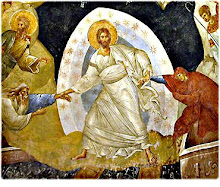
I find it fascinating that the discourse of the risen Christ with the men on the road to Emmaus ends with the men giving an account of the encounter to the other disciples by letting them know that they recognized Jesus when he broke the bread.
Before the men on the road recount this story we see that Jesus opened up the Scriptures to them and because of this their hearts were burning. It is at this time that they share in the 'breaking of bread' with Jesus. In Luke 24: 30-31 we see Jesus follow the same order of events that he did in the Last Supper with the offertory (He took bread), the blessing (gave thanks), the fracture (broke it), and the communion (began to give it to them).
We see this same formula play out with Luke in his later volume of Acts of the Apostles. In Acts 2 we see in verse 42 that the followers of Christ 'devoted themselves to the apostles teaching and to the breaking of bread'.
I think this formula is important to Christians today in two different ways.
First of all, it shows the all importance of the ministry of the word to a community of believers. Reading of Scripture along with the proper teaching office of a minister of God's word is critical. We see Jesus explain the Scripture to the apostles in Luke 24 and he 'opened' up the meaning to the men. We also see the authoritative teaching office of the apostles in Acts 2:42 when we are informed that the new community of believers devoted themselves to apostolic teaching.
Lastly, these passages shine forth the importance of the Lord's Table. Imagine a group of believers that assemble on a Sunday morning with their hearts burning from His word, and that same group comes before His table in communion. What would that communion look like? I propose it would have the elements of the offertory, blessing, fracture, and communion. Not mentioned explicitly in the passages was the Cup, but that would be assumed from the institution passages of the Lord's Supper found in the Gospels and I Corinthians. Also, I believe that passage lays out the importance of koinonia fellowship with Christians. A group of believers that assemble together with their hearts on fire for Christ, communing together at his Table, and then empassioned to go out and become agents of His Kingdom on earth. To me that is exciting stuff!





1 comment:
Amen on the koinonia factor involved in communion. The word for communion in fact comes from koinonia which is also translated 'fellowship.' Too often church folks view fellowship as simply socializing with no particular spiritual nature to it. For the Christian, though, fellowship is about the shared life together we have in Christ. And so the communion is a sharing of the most sacred feast with other Christians. It is NOT just a personal one-on-one time with God, as some folks tend to make it. It is all about partaking TOGETHER of the body & blood of Christ. It is interesting that it isn't until the disciples break the bread with the stranger that they realize it is in fact Jesus!
Post a Comment